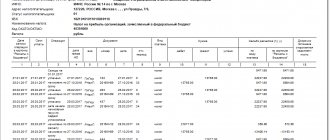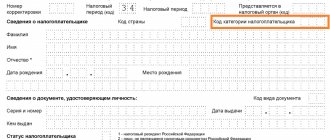How is the presumption of good faith of the taxpayer established in the Tax Code of the Russian Federation?
In tax legislation there is no definition of the concept of “presumption of good faith”, and the term itself is not used in legal regulations. At the same time, from Art. 108 of the Tax Code of the Russian Federation it follows that:
- a person is considered innocent of committing a tax offense until his guilt is proven;
- the burden of proving guilt lies with the tax authorities - the taxpayer himself is not obliged to prove his “tax” innocence;
- all irreducible doubts about the taxpayer’s guilt are interpreted in his favor.
The provisions of this article establish at the legislative level the principle of the presumption of good faith of the taxpayer.
To find out whether the principle of presumption of good faith of the taxpayer helps to defend the VAT deduction in court, follow the link .
In practice, the taxpayer in most cases has to prove his innocence himself.
As a rule, tax authorities first of all try to build the entire scheme of interactions between the taxpayer and his counterparties and establish the role of each person in it. When challenging the decision of the tax authority, the company will have to not only present arguments on specific circumstances, but also prove that the scheme constructed by the inspectorate is erroneous and (or) does not indicate a desire to reduce tax as the main goal of the transaction. To prove that the relationship with the counterparty is justified and all transactions with it are legal, it is necessary to exercise due diligence by checking the counterparty. It is worth checking it according to the same criteria that the tax authority will use.
ConsultantPlus experts explained in detail how to exercise due diligence in relation to a counterparty. Get trial demo access and upgrade to the Ready Solution for free.
With the advent of Art. 54.1 on the prohibition of tax abuse, the taxpayer must take its provisions into account when proving his innocence. Let's look at the contents of this article in more detail.
We talked about the appearance of Article 54.1 in the Tax Code of the Russian Federation here .
Presumption of good faith of taxpayers when assessing the tax consequences of a transaction
Home — Articles
The most important presumption of tax law is the presumption of good faith of the taxpayer.
It should be noted that the very concept of “good faith of the taxpayer” is not enshrined in tax legislation. This evaluation category is fully the result of judicial law-making. At the same time, the main role in determining the content of the concept of “conscientiousness of a taxpayer” and in establishing the criteria for such conscientiousness was played by the Constitutional Court of the Russian Federation and the Supreme Arbitration Court of the Russian Federation.
As the Plenum of the Supreme Arbitration Court of the Russian Federation indicated in Resolution No. 53 of October 12, 2006 “On the assessment by arbitration courts of the validity of a taxpayer receiving a tax benefit,” judicial practice in resolving tax disputes is based on the presumption of good faith of taxpayers and other participants in legal relations in the economic sphere. In this regard, it is assumed that the actions of the taxpayer, resulting in the receipt of a tax benefit, are economically justified, and the information contained in the tax return and financial statements is reliable.
Submission by the taxpayer to the tax authority of all properly executed documents provided for by the legislation on taxes and fees in order to obtain a tax benefit is the basis for receiving it, unless the tax authority proves that the information contained in these documents is incomplete, unreliable and (or) contradictory.
Thus, based on the above explanations of the Plenum of the Supreme Arbitration Court of the Russian Federation, firstly, the taxpayer’s good faith is initially assumed when performing all actions and business transactions, and secondly, the tax authority is charged with the responsibility of proof in disputes regarding the issue of the taxpayer’s good faith.
The Constitutional Court of the Russian Federation, in Ruling No. 138-O of July 25, 2001, also indicated that the tax authority is obliged to prove the revealed dishonesty of taxpayers in the manner established by the Tax Code of the Russian Federation.
From the point of view of the presumption of good faith of the taxpayer, it is interesting to consider the issue of the taxpayer’s responsibility for the actions of its counterparties.
The Resolution of the Plenum of the Supreme Arbitration Court of the Russian Federation dated October 12, 2006 No. 53 on this issue contains ambiguous positions. The Supreme Arbitration Court of the Russian Federation indicated that the fact that the taxpayer’s counterparty violated its tax obligations, as well as the interdependence of the parties to the transactions, do not in themselves constitute evidence that the taxpayer received an unjustified tax benefit.
At the same time, it is emphasized that the tax benefit may be considered unjustified:
- if the tax authority proves that the taxpayer acted without due diligence and caution and he should have been aware of violations committed by the counterparty, in particular, due to the relationship of interdependence or affiliation of the taxpayer with the counterparty;
- if the tax authority proves that the activities of the taxpayer, his interdependent or affiliated persons are aimed at carrying out transactions related to tax benefits, mainly with counterparties who do not fulfill their tax obligations.
Thus, the above-mentioned Resolution of the Plenum of the Supreme Arbitration Court of the Russian Federation does not contain clear guidelines on the issue of the taxpayer’s responsibility for its counterparty. The use by the Supreme Arbitration Court of the Russian Federation of the abstract concept of “due diligence and caution” without defining clear criteria for such circumstances certainly gives the courts complete discretion when considering disputes between the taxpayer and the tax authority.
Accordingly, in order to avoid unnecessary suspicions and conflicts with tax authorities, when concluding transactions, the taxpayer should take care to obtain maximum information regarding counterparties (certified copies of constituent documents, an extract from the Unified State Register of Legal Entities, advertising materials and price offers of the counterparty, printouts of the counterparty’s official websites etc.).
The justification of such actions is confirmed by arbitration practice.
Thus, the Federal Antimonopoly Service of the North-Western District in its Resolution dated December 1, 2006 in case No. A56-16976/2005 noted that the lack of evidence of the taxpayer-exporter’s awareness of violations in the payment of VAT by counterparties does not allow us to speak of his bad faith.
The FAS Moscow District in its Resolution dated January 9, 2007 in case No. KA-A40/12776-06 indicated that if the taxpayer takes measures to verify the legal capacity of counterparties, whether they have the necessary registration, including the fulfillment of tax obligations, the taxpayer cannot be denied the application of tax deductions due to the failure of suppliers to transfer VAT to the budget.
Let's demonstrate this with an example.
Example 1.
Let's assume that the tax authority denies the exporting taxpayer the right to a VAT refund, citing the fact that the taxpayer's supplier did not pay VAT to the budget; accordingly, there is no source for VAT refund. Challenging the decision of the tax authority, the taxpayer in court presents evidence of his “prudence”: certified copies of the supplier’s constituent documents, an extract for the supplier from the Unified State Register of Legal Entities as of the date of the transaction, price lists and commercial offers from the supplier, pre-contractual correspondence, copies of documents confirming authority persons who signed contracts, invoices, etc.
In this situation, it will be extremely difficult for the tax authority to prove the taxpayer’s negligence when choosing a counterparty. In turn, the taxpayer will be able to safely refer to the Resolution of the Plenum of the Supreme Arbitration Court of the Russian Federation dated October 12, 2006 No. 53, proving his due “prudence and caution.”
When determining the limits of a taxpayer's liability for the actions of its counterparties, it is also necessary to take into account the important legal position formulated by the Constitutional Court of the Russian Federation in Determination No. 329-O of October 16, 2003: interpretation of Art. 57 of the Constitution of the Russian Federation in a systematic connection with other provisions of the Constitution of the Russian Federation does not allow us to conclude that the taxpayer is responsible for the actions of all organizations participating in the multi-stage process of paying and transferring taxes to the budget. Within the meaning of the provisions contained in paragraph 7 of Art. 3 of the Tax Code of the Russian Federation, in the field of tax relations there is a presumption of good faith. Law enforcement authorities cannot interpret the concept of “bona fide taxpayers” as imposing additional obligations on taxpayers not provided for by law.
In Resolution No. 53 of October 12, 2006, the Supreme Arbitration Court of the Russian Federation formulates a position that is positive for taxpayers, according to which the taxpayer’s previous “mistakes” should not affect his legal status, the scope of rights and guarantees provided to him. Thus, in paragraph 6 of the Resolution it is noted that the fact of violation of tax legislation in the past cannot in itself serve as a basis for recognizing a tax benefit as unjustified. In addition, paragraph 11 of the Resolution states that recognition of a tax benefit as unjustified should not affect other rights of the taxpayer provided for by the legislation on taxes and fees.
Thus, from now on in judicial practice the use of the so-called stigma of bad faith of the taxpayer should be excluded. However, this novelty has not yet been fully accepted by the courts.
Thus, the FAS of the East Siberian District considered the “depravity” of the suppliers of the taxpayer-exporter to be a sufficient basis for transferring the case for a new trial, which is confirmed by the decisions of arbitration courts previously made in relation to these suppliers (Resolution of November 28, 2006 in case No. A19-26558/ 05-18-32-F02-6335/06-S1).
The presumption of good faith by the taxpayer is closely related to the business purpose doctrine.
As already stated above, in accordance with Resolution of the Plenum of the Supreme Arbitration Court of the Russian Federation dated October 12, 2006 No. 53, it is initially assumed that all actions of the taxpayer resulting in the receipt of tax benefits are economically justified, and all transactions of the taxpayer have a reasonable business purpose.
However, the said Resolution notes that a tax benefit may be considered unjustified, in particular, in cases where, for tax purposes, transactions are taken into account not in accordance with their actual economic meaning or transactions are taken into account that are not due to reasonable economic or other reasons (business purposes) .
A tax benefit cannot be recognized as justified if it was received by the taxpayer outside of connection with the implementation of real business or other economic activity.
It should be taken into account that the possibility of achieving the same economic result with a smaller tax benefit received by the taxpayer by performing other transactions provided for or not prohibited by law is not a basis for recognizing the tax benefit as unjustified.
If the court, based on an assessment of the evidence presented by the tax authority and the taxpayer, comes to the conclusion that the taxpayer for tax purposes took into account transactions not in accordance with their actual economic meaning, the court determines the scope of the rights and obligations of the taxpayer based on the true economic content of the relevant transaction.
As noted by the Plenum of the Supreme Arbitration Court of the Russian Federation, the court’s determination of the presence of reasonable economic or other reasons (business purpose) in the taxpayer’s actions is carried out taking into account the assessment of circumstances indicating his intentions to obtain an economic effect as a result of real business or other economic activity.
Courts must take into account that a tax benefit cannot be considered as a business purpose in its own right. Therefore, if the court establishes that the main goal pursued by the taxpayer was to obtain income solely or primarily through tax benefits in the absence of an intention to carry out real economic activity, recognition of the validity of its receipt may be refused.
From the above explanations of the Supreme Arbitration Court of the Russian Federation, the following conclusions can be drawn.
Firstly, the fictitiousness of a business transaction established by the tax authority and the court (a business transaction only on paper) is an unconditional basis for recognizing the taxpayer as dishonest, and receiving a tax benefit in connection with this business transaction is unjustified, since in this case there is no real business or other economic activities of the taxpayer.
Secondly, obtaining a tax benefit cannot be the sole or primary purpose of a business transaction. However, the Supreme Arbitration Court of the Russian Federation does not rule out that tax benefits may be one of the goals (not the main) of a business transaction.
Thirdly, in cases where the taxpayer has the opportunity to choose to carry out (register) a particular business transaction to achieve the same economic result, the taxpayer has the right to carry out that business transaction that leads to receiving a greater tax benefit (provided that that such a business transaction does not contradict the law).
Example 2.
A common way to minimize taxation in practice is to use a reseller registered in a territory with preferential taxation. The essence of this operation is as follows.
The supplier company sells the goods to the buyer company not directly, but through an intermediary company registered in a territory with preferential taxation. At the same time, the sale of goods from the supplier company to the intermediary company occurs with a minimum trade margin. This scheme allows you to concentrate the main profit from the operation of supplying goods from the supplier company to the buyer company in the territory with preferential taxation. This profit is taxed in a territory with preferential taxation at preferential rates, thereby achieving significant savings in taxes paid.
Courts often recognize this trading transaction scheme as illegal, especially in cases where there are signs of interdependence between the participants in the transaction. At the same time, it is stated that there is no business purpose in transactions concluded with the participation of an intermediary company.
Meanwhile, in our opinion, in the case under consideration it is not always possible to talk about the absence of a business purpose in transactions concluded using an intermediary company.
Let's consider two possible situations.
1. An intermediary company registered in a territory with preferential taxation exists only on paper, without the necessary resources to carry out trading operations (personnel, equipment, transport, warehouse space, etc.). At the same time, there are signs of interdependence between the supplier company and the intermediary company. In this case, of course, we can talk about the absence of a business purpose in transactions concluded with the participation of an intermediary company, since these transactions existed only on paper without the actual movement of goods and pursued the only goal - tax evasion. In reality, the operation of supplying goods took place directly from the supplier company to the buyer company.
2. An intermediary company, registered in a territory with preferential taxation, has warehouse facilities, transport, and equipment for receiving and processing goods. In this case, it cannot be said that there is no business purpose in operations for the supply of goods through an intermediary company. In this case, it does not matter whether there are signs of interdependence between the participants in a trading transaction, as well as the possibility for the supplier company to carry out a trading transaction through another intermediary registered in a territory with general taxation (accordingly, with less tax benefit).
An important legal position was formulated by the Constitutional Court of the Russian Federation in Resolution No. 9-P of May 27, 2003: it is unacceptable to establish liability for such actions of the taxpayer, which, although they result in non-payment of tax or a reduction in its amount, but consist in the use of the rights granted to the taxpayer by law related to legal exemption from tax or the choice of the most profitable forms of entrepreneurial activity for him and, accordingly, the optimal type of payment.
Thus, the Constitutional Court of the Russian Federation also allows for tax optimization (reduction of tax liability) by using any legal forms of entrepreneurial activity, carrying out business transactions not prohibited by law, concluding permissible transactions, etc.
Tax liability, Tax disputes
Responsibility of the payer of insurance premiums
How to submit a correction without penalty if an error is discovered
Federal Tax Service: due diligence criteria
KBK for payment of a fine for failure to submit calculations for insurance premiums
Deferment, installment plan, investment tax credit
Prohibitions and rights of taxpayers under Article 54.1 of the Tax Code of the Russian Federation
Art. 54.1 determines the limits of the taxpayer’s rights to calculate the amount of tax, fee, and insurance payments.
In paragraph 1 of Art. There is a ban on reducing the tax base or tax amount if the taxpayer used inaccurate data when calculating them:
- about the facts of your economic life (or their totality);
- objects of taxation to be reflected in accounting or reporting.
If a business entity uses reliable factual data when determining tax liabilities, it is allowed to reduce the tax base (clause 2 of the article in question). In this case, 2 conditions must be met simultaneously:
- the purpose of the transaction should not be directly related to the reduction of tax liabilities (non-payment (incomplete payment) and (or) offset (refund) of tax);
- the executor of the operation (transaction) must act as a party to the agreement with the taxpayer or other authorized person to whom the obligation to fulfill the agreement has been transferred (by virtue of the agreement or by law).
In the last paragraph of the article, the legislator provides a kind of concession for the taxpayer (we will talk about it later).
This article, although devoted to issues of tax benefit, does not directly explain the concept of unjustified tax benefit, in which controllers are trying to incriminate business entities. In the next section you will learn how judges interpret this concept.
See also: “The Federal Tax Service explained how taxpayer abuses are proven .
The concept of unjustified tax benefit
This term is not deciphered in the Tax Code of the Russian Federation, although proving an unjustified tax benefit (UNB) is widely used by tax authorities in court.
Charges for obtaining INV may come from controllers if:
- in their opinion (based on a preliminary analysis), you are engaged in activities with a high tax risk, and there is a likelihood that you will receive an INV;
- The preliminary opinion of the tax authorities is supported by the results of the tax audit.
The concept of “tax benefit” is deciphered in the resolution of the Plenum of the Supreme Arbitration Court “On the assessment by the courts of the validity of the taxpayer’s receipt of a tax benefit” dated October 12, 2006 No. 53 as a reduction of tax liabilities due to the receipt of:
- rights to a tax deduction, tax refund (offset) and/or refund;
- tax benefits;
And also due to:
- reducing the size of the tax base;
- application of a lower tax rate;
A tax benefit may be recognized as an INV if its receipt is not related to the actual activities of the taxpayer.
With the advent of Art. 54.1, tax legislation now establishes a clear relationship between the actual activities of an economic entity and the possibility of reducing tax liabilities.
Get a complete understanding of how inspectors will now justify their position in disputes with taxpayers, taking into account Art. 54.1 of the Tax Code of the Russian Federation, and an analytical review prepared by ConsultantPlus experts will help you prepare for such disputes. Get trial access to the system for free and proceed to the material.
How due diligence is challenged by tax authorities
For VAT deductions and income tax expenses
Tax lawyer Gordon A.E.
Moscow
June 13, 2022
Operating since 1998 The Tax Code of the Russian Federation does not contain the concept of “Conscientious taxpayer,” although the law enforcement practice of tax disputes for many years has linked the right to use tax benefits (tax deductions and expenses) precisely with conscientiousness in the calculation and payment of taxes.
The concept of good faith of a taxpayer has been repeatedly formulated by the Constitutional Court of the Russian Federation. Thus, characterizing the conscientious behavior of the taxpayer when paying taxes, the Constitutional Court gave the following arguments:
The constitutional obligation of each taxpayer to pay taxes must be considered fulfilled at the moment when the seizure of part of his property intended for payment to the budget as a tax actually occurs. Such withdrawal occurs when the bank debits the appropriate funds from the taxpayer’s current account to pay the tax. After debiting from the current account, the taxpayer’s property has already been confiscated, i.e. tax has been paid. Therefore, the provision on payment of tax contained in Article 57 of the Constitution of the Russian Federation must be understood as the actual withdrawal of tax from taxpayers.
Thus, the Constitution of the Russian Federation provides for a distinction between property that the taxpayer cannot dispose of at his own discretion, since it is subject to contribution to the budget in the form of a certain amount of money, and property that is privately owned, the guarantees of which are provided for in Article 35 of the Constitution of the Russian Federation.
Repeated collection from a bona fide taxpayer of taxes not received into the budget violates the constitutional guarantees of private property. (Resolution of the Constitutional Court of the Russian Federation dated October 12, 1998 N 24-P).
In the described legal situation, a bona fide taxpayer is a taxpayer who fulfills the constitutional obligation to pay taxes to the budget.
At the same time, for practical purposes of tax disputes regarding tax audits for periods up to mid-August 2022, the provisions of paragraph 7 of Article 3 of the Tax Code of the Russian Federation are applied, according to which in the field of tax relations there is a presumption of good faith of taxpayers , and the obligation to prove the bad faith of the taxpayer is assigned to the tax authorities. (Determination of the Constitutional Court of the Russian Federation dated July 25, 2001 N 138-O).
Until mid-August 2022 (entry into force of Article 54.1 of the Tax Code), when resolving tax disputes, the courts adhered to the legal position on the taxpayer’s right to receive a tax benefit if it was justified.
According to the courts, a tax benefit may be recognized as unjustified, in particular, in cases where, for tax purposes, transactions are taken into account not in accordance with their actual economic meaning or transactions are taken into account that are not due to reasonable economic or other reasons (business purposes).
In this regard, it is assumed that the actions of the taxpayer, resulting in the receipt of a tax benefit, are economically justified, and the information contained in the tax return and financial statements is reliable.
Submission by the taxpayer to the tax authority of all properly executed documents provided for by the legislation on taxes and fees in order to obtain a tax benefit is the basis for receiving it, unless the tax authority proves that the information contained in these documents is incomplete, unreliable and/or contradictory.
In this regard, when considering a tax dispute in an arbitration court, the tax authority may present to the court evidence of an unjustified tax benefit for the taxpayer.
These positions are set out in Resolution of the Supreme Arbitration Court of the Russian Federation No. 53 of October 12, 2006.





